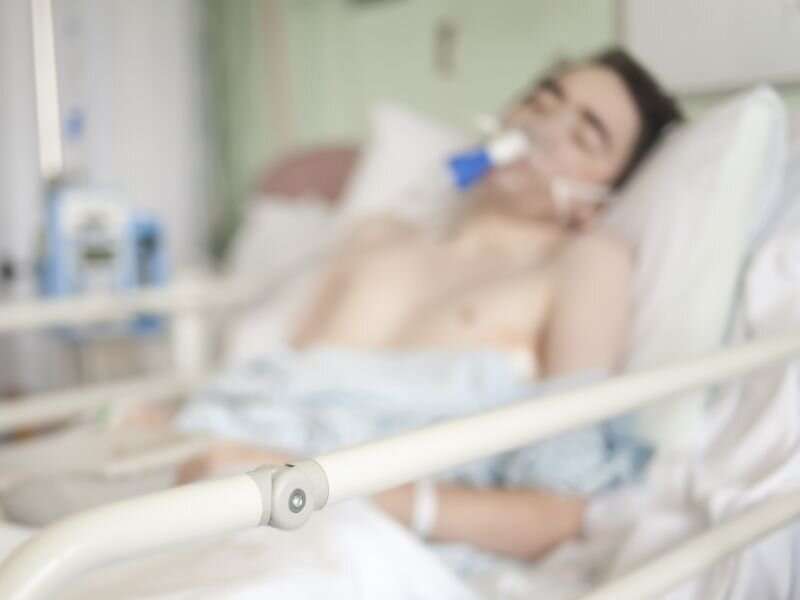Ventilators may leave COVID survivors with windpipe injuries

(HealthDay)—COVID-19 patients who end up on a ventilator may be at risk of rare but serious injuries to the throat, a new study suggests.
The study, at one hospital in Italy, found a high rate of the injuries among COVID-19 patients treated early on in the pandemic. Of 30 who spent at least two weeks on a ventilator, nearly half sustained injuries to the trachea (windpipe) that are normally rare.
Experts said it's not clear how common the injuries might have been at other hospitals earlier in the pandemic. And the risks may be different now, as doctors have learned more about treating COVID-19.
"The management of COVID-19 patients in the second wave is quite different from the first wave," said Dr. Giacomo Fiacchini, the lead author on the study.
At his hospital—Azienda Ospedaliero-Universitaria Pisana, in Pisa—fewer patients end up on ventilators now.
"There is no longer the rush to mechanically ventilate these patients," Fiacchini said. "So the number of intubated patients who need many days of invasive mechanical ventilation has been reduced."
Mechanical ventilators supply potentially life-saving air to patients who cannot breathe on their own, via a tube threaded down the trachea.
But that tube can sometimes place too much pressure on the tracheal tissue, leading to large lesions or even fistulas—abnormal tissue connections between the trachea and the esophagus (the tube that takes water and food from the mouth to the stomach).
Normally, that's a rare risk.
The pandemic, however, has not been a normal time. Of the 30 COVID-19 patients Fiacchini's team studied, 47% suffered a tracheal injury.
All were on ventilators for two weeks or more. But that alone did not explain the high injury rate: The researchers compared their COVID-19 patients with a control group of 45 patients who'd been on ventilators for a similarly long time the year before—when no one had COVID-19.
And only 2% of those patients suffered a tracheal injury, the findings showed.
U.S. critical-care specialists said they were not aware of any hospitals in the United States reporting similar patterns.
"This is a pretty small study," said Dr. Gabriel Lockhart, who directs the intensive care unit at Saint Joseph Hospital/National Jewish Health in Denver.
"This gives us a signal," Lockhart said. "There could be some fire behind the smoke, but it's hard to know if this is seen more broadly."
Dr. Greg Martin, president-elect of the Society of Critical Care Medicine, agreed.
He noted that the patients, all hospitalized between March and May 2020, fell ill earlier in the pandemic, in a country that was one of the earliest hit.
There has been a "learning curve" in managing COVID-19 patients, Martin said. And during the initial surge, staff and resources at some hospitals were stretched thin. It's not clear how much of a factor that was in the United States, he added.
The Italian doctors speculate on some potential reasons for the tracheal injuries. For one, all of their COVID-19 patients were given anti-inflammatory corticosteroid drugs, at high doses.
Lockhart agreed that could have been a factor. The drugs suppress the immune system, which might impede healing of any tissue breakdown caused by the ventilator tube.
It's also possible that placing ventilator patients in the prone position (on the stomach) contributed, according to Fiacchini.
During the pandemic, doctors have found that hospitalized COVID-19 patients can get more oxygen if they spend time in the prone position.
But maneuvering ventilator patients into position might contribute to tracheal injuries, the Italian team speculated.
No one suggested the prone position be abandoned, since it appears generally beneficial.
Instead, Martin said, the risk of tracheal injuries can be mitigated by, for example, closely monitoring the pressure in the ventilator tube and adjusting it so it's not continuously resting in the same place.
The findings highlight a broader point, Martin and Lockhart said: Patients who survive a serious COVID-19 infection can face complications and a long recovery.
The experience of a long intensive care unit (ICU) stay, alone, can cause so-called "post-ICU syndrome," Martin noted. Those problems range from lost muscle mass and strength, to issues with memory and thinking, to post-traumatic stress.
"Even for those who recover [from COVID-19]," Lockhart said, "it's often not a smooth road. Your life may not be the same afterward."
The findings were published online Nov. 19 in JAMA Otolaryngology Head & Neck Surgery.
More information: The U.S. Centers for Disease Control and Prevention has more on COVID-19's long-term effects.
Copyright © 2020 HealthDay. All rights reserved.

















